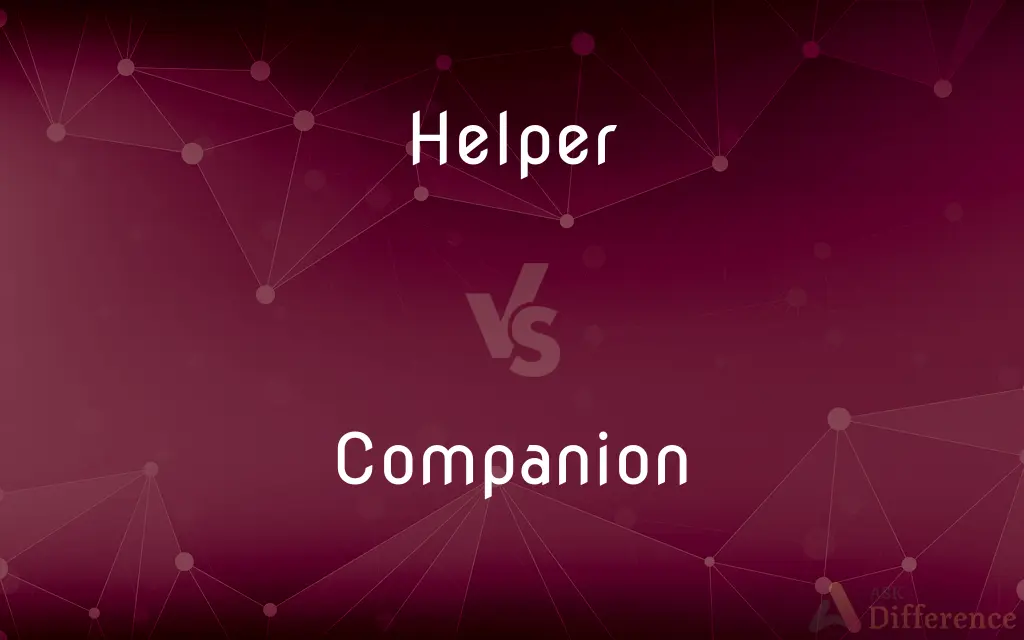Helper vs. Companion — What's the Difference?
By Tayyaba Rehman & Fiza Rafique — Updated on April 16, 2024
A helper provides assistance or support, often in specific tasks or needs, while a companion offers company and emotional closeness, contributing to a sense of belonging and friendship.

Difference Between Helper and Companion
Table of Contents
ADVERTISEMENT
Key Differences
A helper is typically involved in specific tasks, providing targeted assistance based on the needs of others. On the other hand, a companion is someone who shares time with another, offering emotional or social support rather than task-oriented help.
Helpers are often seen in contexts like healthcare, where their role is clearly defined and oriented towards particular outcomes. Whereas companions may simply be present to provide friendship and moral support, such as in elderly care.
In the workplace, a helper might assist with administrative duties or technical support, focusing on alleviating physical or logistical burdens. Conversely, a companion at work could be a colleague who provides support through camaraderie and shared experiences.
Children often benefit from helpers in educational settings, such as tutors or teacher’s aides, who support specific learning objectives. Meanwhile, companions for children might include peers or pets that provide comfort and a sense of security.
During difficult times, a helper might offer practical support, such as running errands or providing information. A companion, however, offers emotional support, perhaps by being a good listener or a stable presence in times of stress.
ADVERTISEMENT
Comparison Chart
Role
Task-oriented assistance
Emotional and social support
Context
Often professional or volunteer
Can be personal or social
Primary Focus
Completing specific tasks
Providing company and belonging
Relationship
May be temporary or goal-specific
Often long-term and emotionally tied
Examples
Home health aide, administrative assistant
Friend, family member, or pet
Compare with Definitions
Helper
Often supports others without taking a lead.
In the kitchen, the helper peeled the vegetables.
Companion
Offers company and emotional closeness.
Her companion during the long journey made the time pass more enjoyably.
Helper
Focused on completing tasks efficiently.
The helper ensured all the conference materials were ready on time.
Companion
Engages in activities together to provide support.
As a companion, he attended the art classes too.
Helper
Can be found in various professional or volunteer capacities.
The community center’s helper coordinated the food drive.
Companion
Often involves a personal connection.
The elderly woman’s companion helped her feel less isolated.
Helper
Someone who aids others in accomplishing tasks.
The helper organized the documents for the meeting.
Companion
Aims to provide comfort and a sense of security.
The child’s companion, a soft teddy bear, was a comforting presence at night.
Helper
Provides help based on specific skills or needs.
The technical helper resolved the computer issue.
Companion
Provides social interaction to enhance quality of life.
The dog was a faithful companion who followed him everywhere.
Helper
To give assistance to (someone); make it easier for (someone) to do something; aid
She helped me with my project. I helped her find her book.
Companion
A person who accompanies or associates with another; a comrade.
Helper
To give material or financial aid to
Help the homeless.
Companion
A domestic partner.
Helper
To wait on, as in a store or restaurant
Please help the customer in aisle 20.
Companion
A person employed to assist, live with, or travel with another.
Helper
To contribute to the effectiveness or improvement of (something); improve or advance
Tax breaks to help create jobs.
New ways to help the environment.
A remark that didn't help the situation.
Companion
One of a pair or set of things; a mate.
Helper
To ease the pain or discomfort of; relieve
Medication to help your cold.
Companion
A companionway.
Helper
To refrain from; avoid or resist. Used with can or cannot
Couldn't help laughing.
Companion
To be a companion to; accompany.
Helper
To be of service; give assistance
I made a cake, and my friend helped.
Companion
A friend, acquaintance, or partner; someone with whom one spends time or accompanies
His dog has been his trusted companion for the last five years.
Helper
To be of use or provide relief
He has a bad back, and physical therapy hasn't helped.
Companion
(dated) A person employed to accompany or travel with another.
Helper
The action of helping; assistance
Do you need help with that package?.
Companion
(nautical) The framework on the quarterdeck of a sailing ship through which daylight entered the cabins below.
Helper
One that helps
You've been a great help. A food processor is a help to the serious cook.
Companion
(nautical) The covering of a hatchway on an upper deck which leads to the companionway; the stairs themselves.
Helper
(Archaic) A person employed to help, especially a farm worker or domestic servant.
Companion
(topology) A knot in whose neighborhood another, specified knot meets every meridian disk.
Helper
Such employees considered as a group. Often used with the.
Companion
(figuratively) A thing or phenomenon that is closely associated with another thing, phenomenon, or person.
Helper
One who helps; an aide; assistant; auxiliary.
Companion
(attributive) An appended source of media or information, designed to be used in conjunction with and to enhance the main material.
The companion guide gives an in-depth analysis of this particular translation.
Helper
That which helps; anything serving to assist.
Companion
(astronomy) A celestial object that is associated with another.
Helper
A person who does cleaning and cooking in a family home, or in a market; domestic employee.
Companion
A knight of the lowest rank in certain orders.
A companion of the Bath
Helper
A locomotive that assists a train, usually on steep gradients.
Companion
A fellow; a rogue.
Helper
One who, or that which, helps, aids, assists, or relieves; as, a lay helper in a parish.
Thou art the helper of the fatherless.
Compassion . . . oftentimes a helper of evils.
Companion
(obsolete) To be a companion to; to attend on; to accompany.
Helper
A person who contributes to the fulfillment of a need or furtherance of an effort or purpose;
My invaluable assistant
They hired additional help to finish the work
Companion
(obsolete) To qualify as a companion; to make equal.
Helper
A person who helps people or institutions (especially with financial help)
Companion
One who accompanies or is in company with another for a longer or shorter period, either from choice or casually; one who is much in the company of, or is associated with, another or others; an associate; a comrade; a consort; a partner.
The companions of his fall.
The companion of fools shall smart for it.
Here are your sons again; and I must loseTwo of the sweetest companions in the world.
A companion is one with whom we share our bread; a messmate.
Companion
A knight of the lowest rank in certain orders; as, a companion of the Bath.
Companion
A fellow; - in contempt.
Companion
A skylight on an upper deck with frames and sashes of various shapes, to admit light to a cabin or lower deck.
Companion
To be a companion to; to attend on; to accompany.
Companion
To qualify as a companion; to make equal.
Companion me with my mistress.
Companion
A person who is frequently in the company of another;
Drinking companions
Comrades in arms
Companion
A traveler who accompanies you
Companion
One paid to accompany or assist or live with another
Companion
Be a companion to somebody
Common Curiosities
What qualities are important in a companion
Important qualities in a companion include empathy, patience, and the ability to engage socially and emotionally.
What defines a helper
A helper is defined by their role in providing specific assistance or completing tasks for others.
Can a helper also be a companion
Yes, in some cases, such as caregiving, a helper can also serve as a companion, blending task support with emotional connection.
How do helpers and companions differ in a healthcare setting
In healthcare, a helper might focus on medical tasks while a companion focuses on emotional support and social interaction.
Why might someone need both a helper and a companion
People may need both to address different aspects of their well-being — practical tasks and emotional health.
How do companions enhance life quality in elderly care
Companions help reduce isolation, provide daily interaction, and support emotional and mental health in elderly care.
How does a companion contribute to someone's life
A companion contributes by offering emotional support and company, enhancing personal or social well-being.
Are companions always human
No, companions can also be pets or even inanimate objects that provide comfort.
Can technology act as a helper or a companion
Technology can act as both, providing task assistance through devices or apps, and companionship through social robots or chatbots.
How do companions affect mental health
Companions can have a positive impact on mental health by reducing feelings of loneliness and increasing a sense of belonging.
What training might a helper need
Helpers often require specific training related to their tasks, such as in healthcare or educational settings.
How does one choose a good helper or companion
Choosing involves considering the specific needs and personal preferences, ensuring the helper or companion can meet these effectively.
What is the typical relationship duration between a helper and the person they assist
The relationship may be short-term and based on specific goals, unlike companionship which may be long-term.
How do children benefit from helpers and companions
Helpers can assist with educational and developmental tasks, while companions can offer emotional security and social development.
What settings are common for helpers to work in
Common settings include homes, schools, offices, and healthcare facilities.
Share Your Discovery

Previous Comparison
Mean vs. Selfish
Next Comparison
Sign vs. SymptomsAuthor Spotlight
Written by
Tayyaba RehmanTayyaba Rehman is a distinguished writer, currently serving as a primary contributor to askdifference.com. As a researcher in semantics and etymology, Tayyaba's passion for the complexity of languages and their distinctions has found a perfect home on the platform. Tayyaba delves into the intricacies of language, distinguishing between commonly confused words and phrases, thereby providing clarity for readers worldwide.
Co-written by
Fiza RafiqueFiza Rafique is a skilled content writer at AskDifference.com, where she meticulously refines and enhances written pieces. Drawing from her vast editorial expertise, Fiza ensures clarity, accuracy, and precision in every article. Passionate about language, she continually seeks to elevate the quality of content for readers worldwide.














































